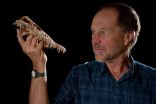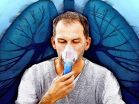(Press-News.org) Platelets, the tiny cell fragments whose job it is to stop bleeding, are very simple. They don't have a cell nucleus. But they can "feel" the physical environment around them, researchers at Emory and Georgia Tech have discovered.
Platelets respond to surfaces with greater stiffness by increasing their stickiness, the degree to which they "turn on" other platelets and other components of the clotting system, the researchers found.
"Platelets are smarter than we give them credit for, in that they are able to sense the physical characteristics of their environment and respond in a graduated way," says Wilbur Lam, MD, PhD, assistant professor in the Department of Pediatrics at Emory University School of Medicine and in the Wallace H. Coulter Department of Biomedical Engineering at Georgia Tech and Emory University.
The results are published in Proceedings of the National Academy of Sciences. The first author of the paper is research associate Yongzhi Qiu. Lam is also a physician in the Aflac Cancer and Blood Disorders Center, Children's Healthcare of Atlanta.
The researchers' findings could influence the design of medical devices, because when platelets grab onto the surfaces of catheters and medical implants, they tend to form clots, a major problem for patient care.
Modifying the stiffness of materials used in these devices could reduce clot formation, the authors suggest. The results could also guide the refinement of blood thinning drugs, which are prescribed to millions to reduce the risk of heart attack or stroke.
The team was able to separate physical and biochemical effects on platelet behavior by forming polymer gels with different degrees of stiffness, and then overlaying them each with the same coating of fibrinogen, a sticky protein critical for blood clotting. Fibrinogen is the precursor for fibrin, which forms a mesh of insoluble strands in a blood clot.
With stiffer gels, platelets spread out more and become more activated. This behavior is most pronounced when the concentration of fibrinogen is relatively low, the researchers found.
"This variability helps to explain platelet behavior in the 3D context of a clot in the body, which can be quite heterogenous in makeup," Lam says.
Qiu and colleagues were also able to dissect platelet biochemistry by allowing the platelets to adhere and then spread on the various gels under the influence of drugs that interfere with different biochemical steps.
Proteins called integrins, which engage the fibrinogen, and the protein Rac1 are involved in the initial mechanical sensing during adhesion, while myosin and actin, components of the cytoskeleton, are responsible for platelet spreading.
"We found that the initial adhesion and later spreading are separable, because different biochemical pathways are involved in each step," Lam says. "Our data show that mechanosensing can occur and plays important roles even when the cellular structural building blocks are fairly basic, even when the nucleus is absent."
INFORMATION:
Platelets modulate clotting behavior by 'feeling' their surroundings
Stiffer substrates lead to stickier platelets, implications for medical device design
2014-09-22
ELSE PRESS RELEASES FROM THIS DATE:
Genetic switch regulates a plant's internal clock based on temperature
2014-09-22
Scientists have discovered a key molecular cog in a plant's biological clock – one that modulates the speed of circadian (daily) rhythms based on temperature.
Transcription factors, or genetic switches, drive gene expression in plants based on external stresses – such as light, rain, soil quality, or even animals grazing on them. A team of researchers at USC has isolated one, called FBH1, that reacts to temperature – tweaking the rhythm here and there as needed while in keeping it on a consistent track.
"Temperature helps keep the hands of the biological clock in the ...
Massachusetts General study reveals gene expression patterns in pancreatic CTCs
2014-09-22
Analysis of circulating tumor cells (CTCs) in a mouse model of pancreatic cancer identified distinct patterns of gene expression in several groups of CTCs, including significant differences from the primary tumor that may contribute to the ability to generate metastases. In their study reported in the Sept. 25 issue of Cell Reports, investigators from the Massachusetts General Hospital (MGH) Cancer Center identified several different classes of pancreatic CTCs and found unexpected factors that may prove to be targets for improved treatment of the deadly tumor.
"Our ...
Infant solar system shows signs of windy weather
2014-09-22
Astronomers using the Atacama Large Millimeter/submillimeter Array (ALMA) have observed what may be the first-ever signs of windy weather around a T Tauri star, an infant analog of our own Sun. This may help explain why some T Tauri stars have disks that glow weirdly in infrared light while others shine in a more expected fashion.
T Tauri stars are the infant versions of stars like our Sun. They are relatively normal, medium-size stars that are surrounded by the raw materials to build both rocky and gaseous planets. Though nearly invisible in optical light, these disks ...
Old drug may be key to new antibiotics
2014-09-22
Hamilton, ON (September 22, 2014) – McMaster scientists have found that an anticonvulsant drug may help in developing a new class of antibiotics.
Although dozens of antibiotics target what bacteria do, their study has looked at how a certain part of bacteria are created, and they found there is a way of stopping it.
The discovery is important as there is growing concern worldwide about how antibiotic resistance is making the cures for infections ineffective. The World Health Organization has declared that antibiotic resistance is a major threat to global health security. ...
Answer to restoring lost island biodiversity found in fossils
2014-09-22
GAINESVILLE, Fla. --- Many native species have vanished from tropical islands because of human impact, but University of Florida scientists have discovered how fossils can be used to restore lost biodiversity.
The key lies in organic materials found in fossil bones, which contain evidence for how ancient ecosystems functioned, according to a new study available online and in the September issue of the Journal of Herpetology. Pre-human island ecosystems provide vital clues for saving endangered island species and re-establishing native species, said lead author Alex Hastings, ...
Higher risk of heart disease for South Asians in Canada
2014-09-22
Hamilton, ON (September 22, 2014) – South Asians living in Canada have a higher rate of heart disease and double the rate of diabetes compared with while people, McMaster researchers have found.
The paper was published today in the Canadian Medical Association Journal (CMAJ Open) and may be found at http://www.cmajopen.ca/content/2/3/E183.full
One of the fastest-growing ethnic groups in the country is the more than one million South Asian people living in Canada, comprising about three percent of the population. They include people from India, Pakistan, Sri Lanka, ...
Snail shells show high-rise plateau is much lower than it used to be
2014-09-22
The Tibetan Plateau in south-central Asia, because of its size, elevation and impact on climate, is one of the world's greatest geological oddities.
At about 960,000 square miles it covers slightly more land area than Alaska, Texas and California combined, and its elevation is on the same scale as Mount Rainier in the Cascade Range of Washington state. Because it rises so high into the atmosphere, it helps bring monsoons over India and other nations to the south while the plateau itself remains generally arid.
For decades, geologists have debated when and how the plateau ...
Cheater, cheater: UGA study shows what happens when employees feel excluded at work
2014-09-22
Athens, Ga. – When employees feel left out, they act out.
That's the message that new research from the University of Georgia Terry College of Business delivers as it explains why employees can become weasels to benefit their work group.
"Everybody has a need for social approval. It's the basis of our human functioning," said Marie Mitchell, co-author of the research and professor of management at UGA. "But when individuals are faced with a risk of social exclusion, it motivates some pretty unsavory behaviors. We already know how people react when they're definitely ...
Reversing the effects of pulmonary fibrosis
2014-09-22
New Haven, Conn. – Yale University researchers are studying a potential new treatment that reverses the effects of pulmonary fibrosis, a respiratory disease in which scars develop in the lungs and severely hamper breathing.
The treatment uses a microRNA mimic, miR-29, which is delivered to lung tissue intravenously. In mouse models, miR-29 not only blocked pulmonary fibrosis, it reversed fibrosis after several days.
The findings were published Sept. 19 in the journal EMBO Molecular Medicine.
"The mimic, when injected into the blood, goes to the lung and it has a ...
Experts provide much-needed policy analysis for clinical integration of next generation sequencing
2014-09-22
HOUSTON – (Sept. 22, 2014) – As genetic sequencing technologies continue to evolve rapidly, becoming part of clinical care, there is a critical need to establish appropriate policies and regulatory frameworks to address potential challenges, legal and ethical experts have said. A special policy issue of the Journal of Law, Medicine & Ethics published online today and edited by experts with the Center for Medical Ethics and Health Policy at Baylor College of Medicine gives policy makers the tools to jumpstart this process.
Experts with the Center for Medical Ethics and ...
LAST 30 PRESS RELEASES:
6 in 10 US women projected to have at least one type of cardiovascular disease by 2050
People’s gut bacteria worse in areas with higher social deprivation
Unique analysis shows air-con heat relief significantly worsens climate change
Keto diet may restore exercise benefits in people with high blood sugar
Manchester researchers challenge misleading language around plastic waste solutions
Vessel traffic alters behavior, stress and population trends of marine megafauna
Your car’s tire sensors could be used to track you
Research confirms that ocean warming causes an annual decline in fish biomass of up to 19.8%
Local water supply crucial to success of hydrogen initiative in Europe
New blood test score detects hidden alcohol-related liver disease
High risk of readmission and death among heart failure patients
Code for Earth launches 2026 climate and weather data challenges
Three women named Britain’s Brightest Young Scientists, each winning ‘unrestricted’ £100,000 Blavatnik Awards prize
Have abortion-related laws affected broader access to maternal health care?
Do muscles remember being weak?
Do certain circulating small non-coding RNAs affect longevity?
How well are international guidelines followed for certain medications for high-risk pregnancies?
New blood test signals who is most likely to live longer, study finds
Global gaps in use of two life-saving antenatal treatments for premature babies, reveals worldwide analysis
Bug beats: caterpillars use complex rhythms to communicate with ants
High-risk patients account for 80% of post-surgery deaths
Celebrity dolphin of Venice doesn’t need special protection – except from humans
Tulane study reveals key differences in long-term brain effects of COVID-19 and flu
The long standing commercialization challenge of lithium batteries, often called the dream battery, has been solved.
New method to remove toxic PFAS chemicals from water
The nanozymes hypothesis of the origin of life (on Earth) proposed
Microalgae-derived biochar enables fast, low-cost detection of hydrogen peroxide
Researchers highlight promise of biochar composites for sustainable 3D printing
Machine learning helps design low-cost biochar to fight phosphorus pollution in lakes
Urine tests confirm alcohol consumption in wild African chimpanzees
[Press-News.org] Platelets modulate clotting behavior by 'feeling' their surroundingsStiffer substrates lead to stickier platelets, implications for medical device design






